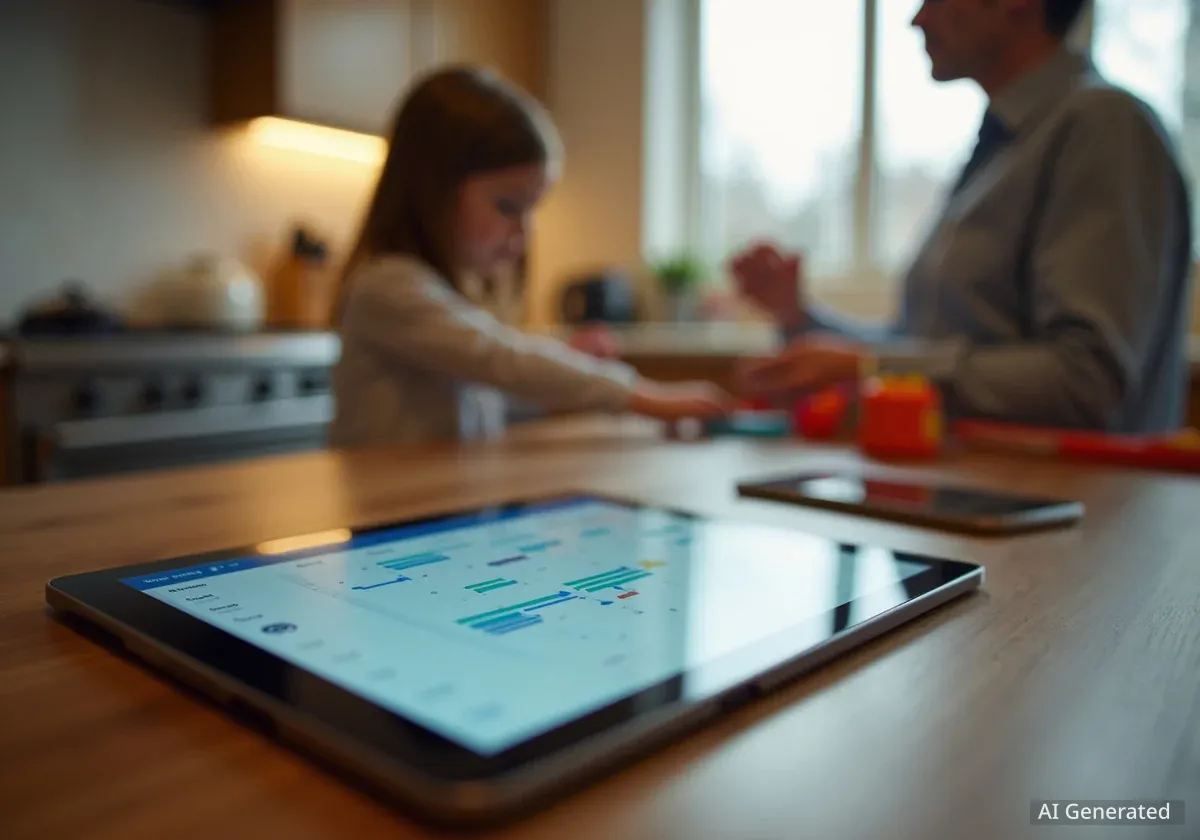Parents are increasingly using artificial intelligence tools like ChatGPT and Gemini as personal assistants to manage the demanding cognitive tasks of running a household. This digital delegation helps with scheduling, planning, and communication, addressing the persistent challenge of the "mental load" that often falls disproportionately on mothers.
Key Takeaways
- Artificial intelligence is being adopted by parents to organize family logistics, from meal planning to managing children's schedules.
- Recent research highlights that life organization is one of the most popular applications for generative AI among users.
- While some parents embrace AI as a helpful tool, others express concerns about over-reliance and the impersonal nature of technology in child-rearing.
- Experts are urging parents to become more involved in understanding how their school-aged children are using AI tools for both education and personal use.
The Rise of the AI Parenting Assistant
For generations, families have used technology to reduce physical labor, from washing machines to dishwashers. Today, a new shift is occurring as parents adopt generative AI to offload cognitive labor. This includes the 'invisible work' of managing appointments, planning meals, coordinating childcare, and handling school communications.
Tools from companies like OpenAI and Google are being used for a wide range of parenting tasks. A parent might ask an AI chatbot to generate a week's worth of healthy school lunches, draft a polite email to a teacher, or create a detailed schedule for a family vacation. This allows them to save time and mental energy on logistical planning.
The trend is supported by new product developments. For example, OpenAI recently introduced ChatGPT Pulse for its Pro subscribers, a version of its chatbot designed to function more like a proactive personal assistant that can anticipate user needs.
AI for Organization
According to recent research from Harvard Business Review, "organizing my life" was the second most popular use case for generative AI in 2025. This indicates a broad trend of people using these tools for personal and family management.
A Digital Extension of the Village
Many parents view these AI tools not as a replacement for their role, but as a support system. They see it as a way to streamline the administrative side of parenting, freeing up more quality time to spend with their children.
"ChatGPT has basically become like an extended village of my parenting," Sandy Shakoor, a public relations director and mother of two, told Axios. This sentiment reflects how AI can fill gaps in modern support networks.
Some working mothers are also using AI to navigate professional communication. They use chatbots to refine the tone of emails and reports, helping them strike a balance that avoids common gender biases in the workplace. While this is a practical shortcut, it highlights a workaround for systemic issues rather than a solution to them.
What is Mental Load?
The term 'mental load' refers to the often invisible, cognitive effort involved in managing a household and family. It includes anticipating needs, tracking progress on tasks, making decisions, and monitoring the emotional well-being of family members. Historically, this burden has fallen more heavily on women.
Hesitation and the Human Element
Despite the growing adoption, not all parents are comfortable integrating AI so deeply into their family lives. A significant portion remains wary of the idea of a "bonus third parent," concerned that over-reliance could diminish the human touch essential to raising children.
Critics point out that much of parenting, especially with young children, is fundamentally physical and emotional work. AI cannot comfort a sick child, mediate a sibling dispute, or provide the physical presence that caregiving requires. The futuristic idea of a fully capable robotic helper like 'Rosie the Robot Maid' from The Jetsons remains firmly in the realm of science fiction.
There are also practical concerns about data privacy and the reliability of AI-generated advice. Parents must still use their own judgment to verify information and make decisions that are best for their specific family situation.
The Next Generation's Relationship with AI
As parents normalize the use of AI in the home, experts are shifting their focus to how children are interacting with these powerful tools. With students from elementary to high school using generative AI for schoolwork and personal curiosity, a new set of challenges and opportunities has emerged.
Neuroscientists, child development specialists, and educators are encouraging parents to engage with their children about their AI usage. It's important for them to understand what platforms their kids are using, what kind of information they are seeking, and whether they can distinguish between factual and fabricated content.
Kris Perry, executive director of Children and Screens at the Institute of Digital Media and Child Development, notes that there's essentially "an experiment underway" with young people and AI. Because a large percentage of children are already using these tools, understanding the impact is a critical and urgent task.
The key, according to experts, is not to ban the technology but to foster digital literacy. Parents are advised to teach their children how to use AI responsibly, think critically about the outputs, and understand its limitations. This guidance is essential as AI becomes an increasingly integrated part of modern education and daily life.





